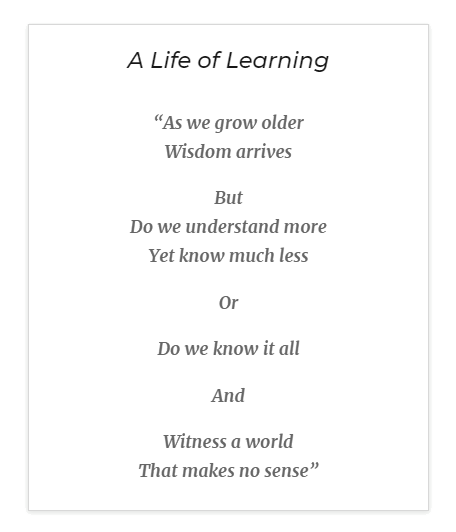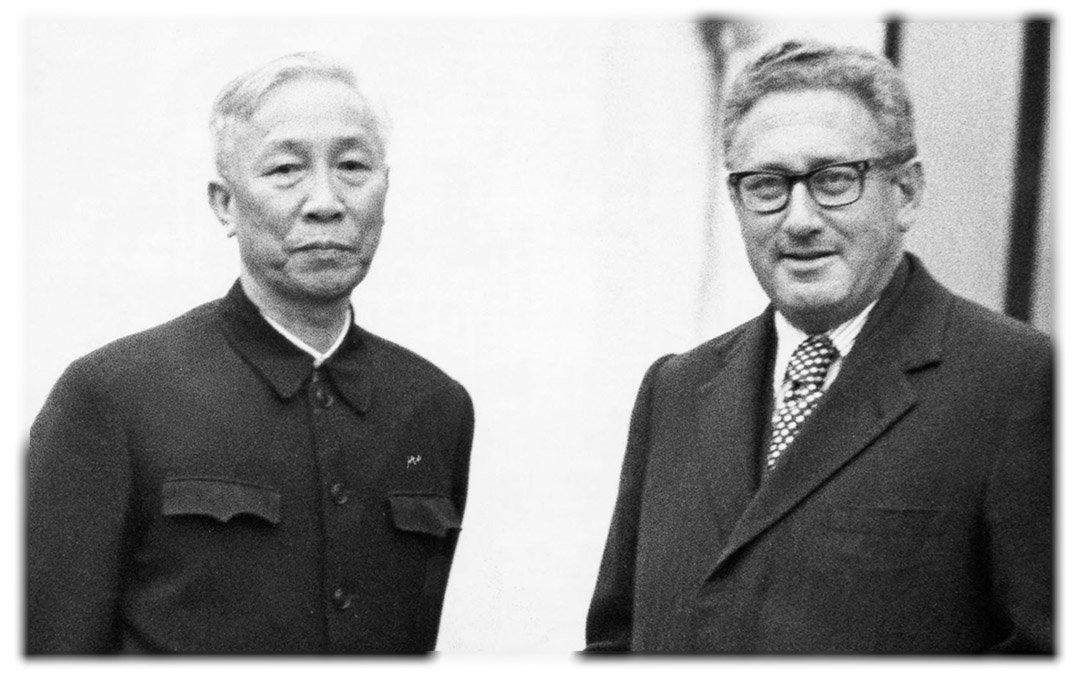Hindsight is a wonderful thing, unless we can learn from it. As I look back on world events I realise how much my perspective has changed. Did the world change? Or have I?
The Vietnam war supposedly ended in 1973, the year I turned 17. US Secretary of State Henry Kissinger and North Vietnamese Foreign Minister Le Duc Tho were awarded the Peace Price by the Norwegian Nobel Committee later that year. Like most Norwegians, and indeed a majority of people in the western world, I saw it as just reward for a great achievement.
Others knew better even then, but for me and many more it took years to accept the reality of the atrocities committed in the name of freedom, and the hypocrisy of all the parties involved in those “peace” negotiations. Or in the words of sixties protest singer Tom Lehrer: “Political satire became obsolete when Henry Kissinger was awarded the Nobel peace prize.”
Three years later – in 1976 – I happily joined the Norwegian Army as a conscripted infantry man, learnt to shoot a gun, aiming at cardboard cut-outs of Russian soldiers. Myopia prevented me from hitting the targets and from being sent up north together with the majority of the army; where it was protecting Norway’s short, but strategically important border with the Soviet Union – THE enemy. Instead I served out my soldiering days checking travel expense forms for the top brass at the Ministry of Defence.
With how I feel and what I know today, I would have been a conscientious objector then; been ostracised by my peers, even risked jail. Today I know that war has only victims, and that the Vietnam war, and the Korean war before it, were both results of the political manoeuvring of men seeking power and influence; using the people of those countries as pawns in a board game also known as the Cold War. 
Not that the Cold War wasn’t really scary. Josef Stalin (and his successors), every bit as evil as Adolf Hitler, did indeed want world domination. The threat of nuclear catastrophe was hanging over us, and democratic nations were in the minority. The might and riches of America was the beacon of freedom and hope. American soldiers and nuclear power had helped free the world from the Nazis, and because of that, successive US presidents got away with murder. They still do. (As do Putin, Assad, Netanyahu, the Ayatollahs and so many more of the world’s war mongering leaders.)
After my “tour of duty” doing travel expenses, I went to business school and learnt lots more about the intricacies of book-keeping, commerce, finance, marketing and my favourite subject: economics. I read Adam Smith, dabbled in Keynes, dismissed Marx, revelled in Milton Friedman, thought Allan Greenspan was pretty cool, too. Richard Nixon abandoning Bretton Woods was a brave act of liberating the markets. Capitalism was good, communism was evil.
The debate about the merits of communism as an economic system ended at the Berlin Wall in October of 1989, of course. But those that hail that as a win for capitalism has failed to understand that Adam Smith and Karl Marx were both mostly wrong. Neither understood the potential or limitations of mankind, nor man’s unbridled desire for power and control. And I have come to realise that although I still believe in the importance of innovation and enterprise, capitalism as a system is equally flawed. Maybe not in theory, but certainly in practice.
Fact is, just as Karl Marx would have turned over in his grave witnessing the bastardisation of collectivism by Lenin, Trotsky and Stalin, Ayn Rand would no doubt cringe at seeing her ideas of individualism destroyed by a world inhabited by many more Ellsworth Tooheys than Howard Roarks. What we now know, is that the so called free market economy heralded by politicians for the last seven decades have indeed brought prosperity to many, but has also led to extremes of inequality possibly not seen since the days of Louis XVI and Marie Antoinette. And as we know it didn’t end well for them during the first French Revolution, a revolution borne on ideals of liberty so eloquently expressed by Voltaire and his cohorts.
Sadly, the deeds of the Jacobins failed to match the rhetoric. Today ideas no longer has a prominent place in the public discourse. Partly because ideology has been usurped by a combination of pragmatism of leadership and apathy of the populace. But also because mankind today faces the unprecedented and existential threat of climate change.
Back in the seventies we called it pollution; mostly related to sewerage, smog, waste treatment and disposal. They were seen as discreet and localised problems, and many of them were overcome and remedied through the next two or three decades. At least in the “first” world that could afford to invest in better sewerage plants, reduction in coal burning, emission control, waste recycling programs and other such initiatives. Globally, the use of aerosol as a spray propellant was dramatically reduced.
As a consequence of those now somewhat Pyrrhic victories, I admit not to take this “climate change thing” too seriously for a long time. I thought that human ingenuity and self-interest would “fix it” in due course and that there were many more pressing concerns for the world to address. Especially eradicating hunger and poverty and ending warfare as a means of conflict resolution. These are, of course, still important issues to address, but I realise that if the world continues to heat up at the present rate for the next several decades, drowning and eradication of our habitat makes hunger and “Weapons of Mass Destruction” secondary problems.
Hindsight is, of course, rather useless, but nevertheless I recognise that how I saw the world some forty-five years ago has changed; in some cases fundamentally. The soldiers of America may have been the saviours of the world once, but the mighty military industrial complex is today as much a threat to the world as any despot with an axe to grind and a button to push. “Free enterprise” never really did exist and probably never will. Political parties are rarely benevolent harbingers of ideas for the advancement of democracy, but self serving organisations beholden to their donors and with scant regard for the electorate.
And where I once thought that individual freedom was at the core of solving all problems, I now appreciate that individualism without respecting and participating in the community is the root cause of many of the ills of humanity.
What hasn’t changed is that I remain an optimist, the alternative is just not worth contemplating. I still believe that all progress start with a crazy idea and can only be carried out by strong minded individuals who stir their fellow citizens into action.
And I still believe in freedom of speech as the most immutable of individual rights.
Forty-five years after Kissinger received the Nobel peace prize (Le Duc Tho at least had the “decency” to renounce his share), this year we may well see history repeat itself and the not so noble Nobel Committee awarding it to the Korean leaders, maybe even to Donald Trump.
I very much doubt I will ever change my mind on what I think about that! 

Well said Kim. Pretty much in full agreement. I also would have gone to vietnam if my number came up in the draft and i didn’t know any of the little I think I know now. With the poisoning in the UK and the chem weapons use (or not) in syria the truth is almost impossible to know from main stream news.
Believe nothing.